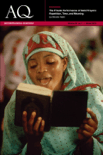
ANTHROPOLOGICAL QUARTERLY
metrics 2024
Bridging Theory and Practice in Ethnographic Research
Introduction
ANTHROPOLOGICAL QUARTERLY, published by the George Washington University Institute of Ethnographic Research, stands as a vital resource in the field of anthropology and broader arts and humanities studies. With an ISSN of 0003-5491 and an E-ISSN of 1534-1518, this esteemed journal has been contributing to academic discourse since its establishment in 1981. The journal holds a respected position in both the Q2 category for Anthropology and the Q2 category for Arts and Humanities (miscellaneous), demonstrating its impact and relevance, as evidenced by its rank of #152 out of 502 in the Social Sciences sector for anthropology and rank of #179 out of 552 in the Arts and Humanities field. Researchers, professionals, and students can rely on ANTHROPOLOGICAL QUARTERLY for rigorous peer-reviewed articles that push the boundaries of ethnographic research and anthropological theory, addressing contemporary issues with scholarly precision. The journal’s commitment to fostering critical analysis and interdisciplinary perspectives establishes it as an essential platform for advancing knowledge within its diverse and dynamic field.
Metrics 2024
 0.30
0.30 0.80
0.80 1.10
1.10 55
55Metrics History
Rank 2024
Scopus
IF (Web Of Science)
JCI (Web Of Science)
Quartile History
Similar Journals

Anthropological Notebooks
Fostering Interdisciplinary Dialogues in AnthropologyAnthropological Notebooks, published by the SLOVENE ANTHROPOLOGICAL SOC, is a noteworthy journal within the field of anthropology. Established in Slovenia, this journal aims to provide a platform for scholarly dialogue and dissemination of anthropological research, fostering interdisciplinary approaches and global perspectives. Although it currently holds a Q4 quartile ranking in anthropology and ranks #421 out of 502 in Scopus, it serves as an essential conduit for emerging voices and innovative ideas in the discipline. Covering research published from 2010 to 2019 and from 2021 to 2024, the journal invites contributions that explore diverse cultural narratives and anthropological insights. Despite its limited open access options, Anthropological Notebooks remains a crucial resource for researchers, professionals, and students seeking to engage with contemporary anthropological discourse and enrich their understanding of human societies.

DIALECTICAL ANTHROPOLOGY
Illuminating the Nuances of Dialectical ThoughtDIALECTICAL ANTHROPOLOGY, published by SPRINGER, is a prestigious journal within the field of anthropology, recognized for its substantial contributions to dialectical and critical theory in social research. Since its inception in 1975, the journal has carved a niche by exploring the intersections of culture, society, and politics, making it an essential resource for scholars and practitioners. With an impact factor that places it in the Q2 category for both anthropology and arts and humanities, and significant rankings in sociology and political science, it reflects a solid scholarly reputation. The journal operates on a subscription basis, allowing for a wide dissemination of rigorous academic research without open access. With ISSN 0304-4092 and E-ISSN 1573-0786, DIALECTICAL ANTHROPOLOGY serves as a crucial platform for fostering dialogue and advancing knowledge in contemporary anthropology and related disciplines. As a researcher, professional, or student, engaging with the insights presented in this journal will deepen your understanding of the dynamic interplay between structural and agency-oriented perspectives in social contexts.
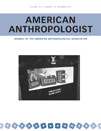
AMERICAN ANTHROPOLOGIST
Connecting scholars to a world of anthropological insights.American Anthropologist is a prestigious journal published by Wiley, dedicated to advancing the field of anthropology. With a rich publishing history dating back to 1888, it has become a leading platform for scholarly discourse, showcasing innovative research and diverse perspectives from around the globe. The journal holds impressive ranks within its categories, being recognized as Q1 in both Anthropology and Arts and Humanities, alongside a notable Scopus ranking of #36 out of 502 in Social Sciences. Its robust impact in academia is reflected in its emphasis on interdisciplinary approaches that resonate within the fields of social science and humanities. Researchers and students alike are encouraged to contribute to this vital resource that continues to shape anthropological thought and practice. For those interested, the journal is tailored for non-open access, ensuring the curation of high-caliber scholarly work accessible to a wide audience while supporting the standards of peer-reviewed publications.
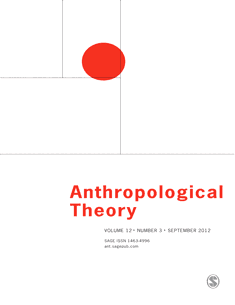
Anthropological Theory
Exploring the Depths of Human ExperienceAnthropological Theory, published by SAGE Publications Ltd, stands at the forefront of the field of anthropology, delivering cutting-edge research and critical analyses that shape contemporary understanding of human societies. With its ISSN 1463-4996 and E-ISSN 1741-2641, this distinguished journal boasts an impressive impact factor and has been recognized in the Q1 quartile category across both anthropology and arts and humanities disciplines, reflecting its high citation rates and scholarly influence. Covering a wide range of topics from cultural practices to social dynamics, Anthropological Theory serves as an essential resource for researchers, professionals, and students alike, fostering a rich dialogue within the academic community. The journal's continuous publication since 2001 ensures a dynamic platform for emerging theories and methodologies, providing invaluable insights for those engaged in anthropological discourse. Its recognition within the top percentile rankings of Scopus further underscores its significance and attractiveness to contributors seeking to disseminate their work on a global stage.

Social Analysis
Charting New Territories in Social AnalysisSocial Analysis, an esteemed academic journal published by BERGHAHN JOURNALS, is at the forefront of interdisciplinary research, focusing on the dynamic intersections of anthropology, cultural studies, sociology, and the arts and humanities. Since its inception in 2002 and having transitioned to an Open Access model in 2020, the journal ensures that critical social research is widely accessible to scholars and the public alike. With an impressive Q1 ranking in Anthropology and cultural studies and holding a notable Q2 in Sociology and Political Science, it garners attention from a large academic audience, as evidenced by its high Scopus rankings: 10th in general arts and humanities and 153rd in cultural studies. This signifies its influential role in shaping contemporary discourse and providing a platform for innovative ideas and methodologies in understanding social phenomena. Based in Brooklyn, NY, the journal is dedicated to fostering scholarly dialogue and advancing the field, making it an essential resource for researchers, professionals, and students eager to engage with and contribute to the field of social analysis.

Annual Review of Anthropology
Bridging Disciplines for a Deeper UnderstandingAnnual Review of Anthropology is a premier journal published by Annual Reviews, dedicated to providing comprehensive and authoritative reviews in the field of anthropology. Established with the goal of synthesizing essential research findings, this influential publication not only shapes contemporary anthropological discourse but also facilitates interdisciplinary dialogue within the broader realm of social sciences and cultural studies. With an impressive impact factor that places it in the Q1 category across multiple classifications, including Anthropology and Arts and Humanities, this journal is highly regarded by researchers and academics alike. The Annual Review of Anthropology has been a trusted resource for critical insights and transformative ideas, helping to advance the understanding of human societies from 1980 to the present. Although it does not offer open access, access to its articles is available through various academic institutions, ensuring that both seasoned scholars and students can benefit from its wealth of knowledge. With a Scopus ranking placing it in the top percentiles for relevant subjects, this journal is essential reading for anyone looking to stay at the forefront of anthropological research.

Boletin Antropologico
Connecting Scholars to the Heart of Human SocietyBoletin Antropologico, published by UNIV LOS ANDES, is a vital academic journal dedicated to the field of anthropology, focusing on the diverse cultural practices, social structures, and historical contexts of societies, particularly within Latin America. With its ISSN of 0257-750X, this journal aims to provide a platform for researchers and scholars to disseminate their findings and engage in meaningful discussions that advance the understanding of anthropological issues. Although Boletin Antropologico currently does not follow an open-access model, it remains a significant resource for professionals seeking peer-reviewed content that reflects rigorous academic standards. With a commitment to fostering intellectual growth and collaboration among anthropologists, the journal serves as an essential reference for students and practitioners keen on exploring the rich tapestry of human cultures and societies.
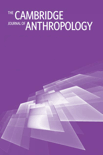
Cambridge Journal of Anthropology
Advancing anthropological insights for a global audience.Cambridge Journal of Anthropology is a prestigious and internationally recognized journal published by BERGHAHN JOURNALS, dedicated to advancing the field of anthropology. The journal, with ISSN 0305-7674 and E-ISSN 2047-7716, has embraced an Open Access model since 2020, ensuring that groundbreaking anthropological research is easily accessible to scholars, practitioners, and students worldwide. With a commitment to enriching the academic discourse in anthropology, the journal welcomes high-quality articles that contribute to both theoretical and applied aspects of the discipline. The Cambridge Journal of Anthropology serves as a vital resource for researchers eager to explore contemporary anthropological issues, fostering an inclusive dialogue on cultural diversity, social structures, and human experiences. As scholars increasingly turn to open platforms for disseminating their work, this journal stands out as a leading venue for innovative research that shapes the future of anthropology.
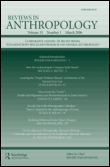
Reviews in Anthropology
Connecting Scholars, Cultures, and IdeasReviews in Anthropology, published by Routledge Journals, Taylor & Francis Ltd, is a vital academic journal for scholars and practitioners in the fields of anthropology and cultural studies. With a history extending from 1974 to 2024, this journal reflects the evolving discourse within the social sciences, offering a collection of insightful reviews and critiques that shape contemporary anthropological thought. Although it operates under a non-open access model, its impact is underscored by its positioning in the Q3 quartile for both Anthropology and Cultural Studies, as well as respectable Scopus rankings. This journal serves as a platform for disseminating influential research, fostering academic dialogue, and enhancing understanding of diverse cultures and societies. Its robust editorial board and commitment to quality scholarship make it an essential resource for researchers, professionals, and students looking to deepen their knowledge and contribute to the ever-changing landscape of anthropology.

CRITIQUE OF ANTHROPOLOGY
Illuminating Anthropological Insights Since 1974CRITIQUE OF ANTHROPOLOGY, published by SAGE PUBLICATIONS LTD, stands as a vital platform in the field of anthropology, contributing significantly to the discourse surrounding cultural practices and societal norms since its inception in 1974. Recognized for its scholarly rigor, this esteemed journal holds a Q2 category ranking in both Anthropology and Arts and Humanities as of 2023, with impressive standings in Scopus, including a rank of 55 out of 502 in Social Sciences and 107 out of 552 in Arts and Humanities. The journal's extensive scope—from theoretical critiques to empirical studies—facilitates a rich exchange of ideas among researchers, professionals, and students, thereby enriching the anthropology community. Although CRITIQUE OF ANTHROPOLOGY does not provide open access, its prestigious reputation and impact on the field make it an essential resource for those seeking to deepen their understanding of anthropological scholarship.